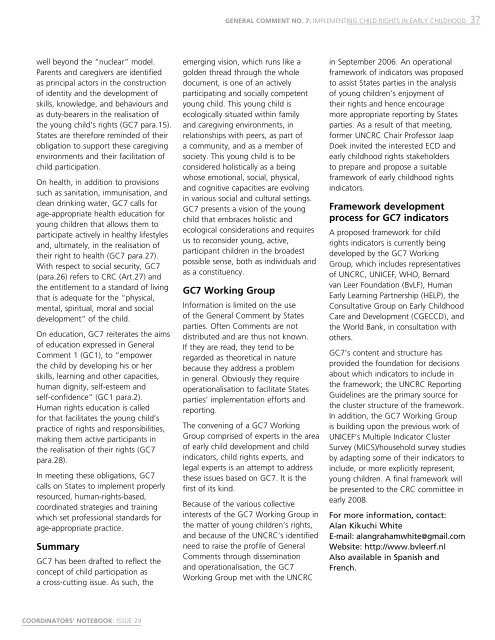A global call to action for early childhood
A global call to action for early childhood
A global call to action for early childhood
You also want an ePaper? Increase the reach of your titles
YUMPU automatically turns print PDFs into web optimized ePapers that Google loves.
General comment no. 7: Implementing child rights in <strong>early</strong> <strong>childhood</strong><br />
37<br />
well beyond the “nuclear” model.<br />
Parents and caregivers are identified<br />
as principal ac<strong>to</strong>rs in the construction<br />
of identity and the development of<br />
skills, knowledge, and behaviours and<br />
as duty-bearers in the realisation of<br />
the young child’s rights (GC7 para.15).<br />
States are there<strong>for</strong>e reminded of their<br />
obligation <strong>to</strong> support these caregiving<br />
environments and their facilitation of<br />
child participation.<br />
On health, in addition <strong>to</strong> provisions<br />
such as sanitation, immunisation, and<br />
clean drinking water, GC7 <strong>call</strong>s <strong>for</strong><br />
age-appropriate health education <strong>for</strong><br />
young children that allows them <strong>to</strong><br />
participate actively in healthy lifestyles<br />
and, ultimately, in the realisation of<br />
their right <strong>to</strong> health (GC7 para.27).<br />
With respect <strong>to</strong> social security, GC7<br />
(para.26) refers <strong>to</strong> CRC (Art.27) and<br />
the entitlement <strong>to</strong> a standard of living<br />
that is adequate <strong>for</strong> the “physical,<br />
mental, spiritual, moral and social<br />
development” of the child.<br />
On education, GC7 reiterates the aims<br />
of education expressed in General<br />
Comment 1 (GC1), <strong>to</strong> “empower<br />
the child by developing his or her<br />
skills, learning and other capacities,<br />
human dignity, self-esteem and<br />
self-confidence” (GC1 para.2).<br />
Human rights education is <strong>call</strong>ed<br />
<strong>for</strong> that facilitates the young child’s<br />
practice of rights and responsibilities,<br />
making them active participants in<br />
the realisation of their rights (GC7<br />
para.28).<br />
In meeting these obligations, GC7<br />
<strong>call</strong>s on States <strong>to</strong> implement properly<br />
resourced, human-rights-based,<br />
coordinated strategies and training<br />
which set professional standards <strong>for</strong><br />
age-appropriate practice.<br />
Summary<br />
GC7 has been drafted <strong>to</strong> reflect the<br />
concept of child participation as<br />
a cross-cutting issue. As such, the<br />
emerging vision, which runs like a<br />
golden thread through the whole<br />
document, is one of an actively<br />
participating and socially competent<br />
young child. This young child is<br />
ecologi<strong>call</strong>y situated within family<br />
and caregiving environments, in<br />
relationships with peers, as part of<br />
a community, and as a member of<br />
society. This young child is <strong>to</strong> be<br />
considered holisti<strong>call</strong>y as a being<br />
whose emotional, social, physical,<br />
and cognitive capacities are evolving<br />
in various social and cultural settings.<br />
GC7 presents a vision of the young<br />
child that embraces holistic and<br />
ecological considerations and requires<br />
us <strong>to</strong> reconsider young, active,<br />
participant children in the broadest<br />
possible sense, both as individuals and<br />
as a constituency.<br />
GC7 Working Group<br />
In<strong>for</strong>mation is limited on the use<br />
of the General Comment by States<br />
parties. Often Comments are not<br />
distributed and are thus not known.<br />
If they are read, they tend <strong>to</strong> be<br />
regarded as theoretical in nature<br />
because they address a problem<br />
in general. Obviously they require<br />
operationalisation <strong>to</strong> facilitate States<br />
parties’ implementation ef<strong>for</strong>ts and<br />
reporting.<br />
The convening of a GC7 Working<br />
Group comprised of experts in the area<br />
of <strong>early</strong> child development and child<br />
indica<strong>to</strong>rs, child rights experts, and<br />
legal experts is an attempt <strong>to</strong> address<br />
these issues based on GC7. It is the<br />
first of its kind.<br />
Because of the various collective<br />
interests of the GC7 Working Group in<br />
the matter of young children’s rights,<br />
and because of the UNCRC’s identified<br />
need <strong>to</strong> raise the profile of General<br />
Comments through dissemination<br />
and operationalisation, the GC7<br />
Working Group met with the UNCRC<br />
in September 2006. An operational<br />
framework of indica<strong>to</strong>rs was proposed<br />
<strong>to</strong> assist States parties in the analysis<br />
of young children’s enjoyment of<br />
their rights and hence encourage<br />
more appropriate reporting by States<br />
parties. As a result of that meeting,<br />
<strong>for</strong>mer UNCRC Chair Professor Jaap<br />
Doek invited the interested ECD and<br />
<strong>early</strong> <strong>childhood</strong> rights stakeholders<br />
<strong>to</strong> prepare and propose a suitable<br />
framework of <strong>early</strong> <strong>childhood</strong> rights<br />
indica<strong>to</strong>rs.<br />
Framework development<br />
process <strong>for</strong> GC7 indica<strong>to</strong>rs<br />
A proposed framework <strong>for</strong> child<br />
rights indica<strong>to</strong>rs is currently being<br />
developed by the GC7 Working<br />
Group, which includes representatives<br />
of UNCRC, UNICEF, WHO, Bernard<br />
van Leer Foundation (BvLF), Human<br />
Early Learning Partnership (HELP), the<br />
Consultative Group on Early Childhood<br />
Care and Development (CGECCD), and<br />
the World Bank, in consultation with<br />
others.<br />
GC7’s content and structure has<br />
provided the foundation <strong>for</strong> decisions<br />
about which indica<strong>to</strong>rs <strong>to</strong> include in<br />
the framework; the UNCRC Reporting<br />
Guidelines are the primary source <strong>for</strong><br />
the cluster structure of the framework.<br />
In addition, the GC7 Working Group<br />
is building upon the previous work of<br />
UNICEF’s Multiple Indica<strong>to</strong>r Cluster<br />
Survey (MICS)/household survey studies<br />
by adapting some of their indica<strong>to</strong>rs <strong>to</strong><br />
include, or more explicitly represent,<br />
young children. A final framework will<br />
be presented <strong>to</strong> the CRC committee in<br />
<strong>early</strong> 2008.<br />
For more in<strong>for</strong>mation, contact:<br />
Alan Kikuchi White<br />
E-mail: alangrahamwhite@gmail.com<br />
Website: http://www.bvleerf.nl<br />
Also available in Spanish and<br />
French.<br />
COORDINATORS’ NOTEBOOK: ISSUE 29
















